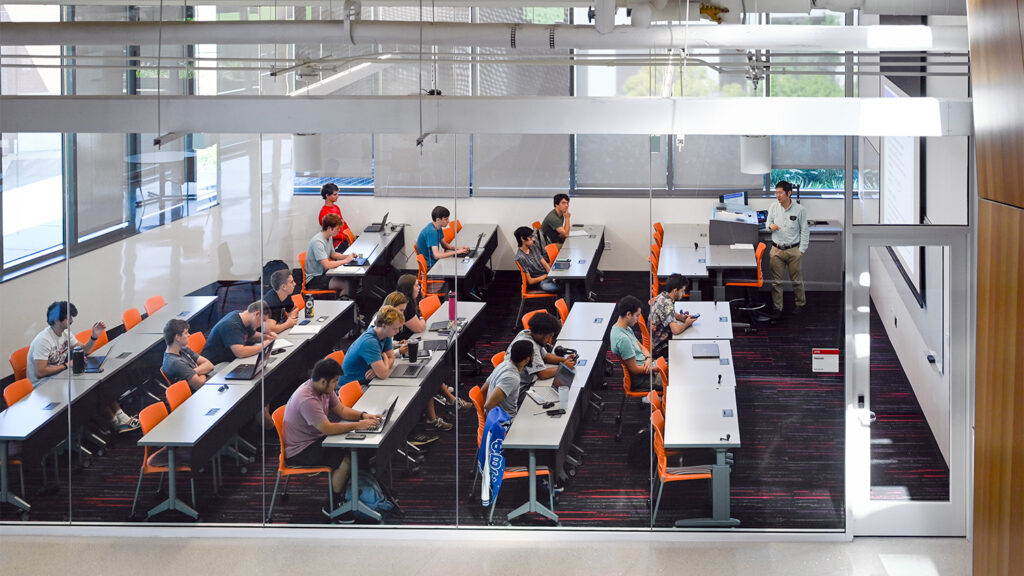Moving forward
Engineering expansion will help meet the workforce needs of the growing North Carolina economy

After graduating from NC State University with undergraduate degrees in computer science and economics in 2020, Oscar Molina had a decision to make.
As he prepared to start a career, Molina considered relocating to one of the country’s technology hot spots, including Seattle, the Bay Area and Austin. Yet, there was a desire to remain close to family in North Carolina and to the University that he’d come to love and the friends that he’d made there. Molina was a student ambassador in the Department of Computer Science during his time on campus, and the former Goodnight Scholar has stayed active with that program as an alumnus, serving on interview committees for the next generation of scholarship recipients.
Thankfully, he didn’t have to choose.
After an internship with Deutsche Bank as an undergraduate student, Molina accepted a position with the company after graduation and works as a software engineer at its offices in Cary, North Carolina.
The Research Triangle region of North Carolina is booming, regularly landing on top-10 lists of the best places to live and work, attracting newcomers from across the nation and expanding opportunities in software, aerospace and biomanufacturing, among other industries. For NC State graduates like Molina, it means being able to start a career with a top company without having to leave the area.
“You can have a very good balance of what you can do, what you can afford and what you want,” he said of living and working in the area.
The availability of that career and life balance is getting attention. Since 2010, Raleigh has been the second-fastest growing metropolitan area in the country out of 384 such areas. New residents, and top technology companies, have flocked to the area.
In recent years, Apple and Google announced plans to open offices in North Carolina and create thousands of jobs.

They are joining the likes of SAS Institute, Cisco, IBM and other technology companies that have a large presence here and rely on NC State to provide them with the talent that they need to thrive. Recognizing a need for NC State to do even more to meet demand as the state continues to grow, the North Carolina General Assembly in 2021 announced Engineering North Carolina’s Future. This initiative is designed to increase NC State’s capacity to enroll and graduate engineering and computer science students in order to help meet North Carolina’s workforce needs.
Under the plan, the College of Engineering will add 4,000 undergraduate and graduate students to its enrollment over the next few years and expects to grow by over 100 faculty positions to ensure that the College will continue offering the highest-quality educational experiences for its students. Engineering North Carolina’s Future also includes investments to expand programs at the University of North Carolina at Charlotte and North Carolina Agricultural and Technical State University.
While the demand for College of Engineering graduates like Molina is high, so too is the demand for seats in NC State’s engineering classrooms. This year alone, the College received more than 12,000 applications for a coveted 1,800 seats in its 2024 class of first-year, full-time students.
“Engineering North Carolina’s Future will help our College welcome more of the state’s high-achieving students who want to study at one of the nation’s leading engineering colleges,” said Jim Pfaendtner, Louis Martin-Vega Dean of the College of Engineering. “We’re poised to help meet the workforce needs of our state’s most important industries by producing more outstanding engineers and computer scientists.”
The expansion initiative began with a pledge of $20 million in one-time funds for faculty and staff hiring and $30 million in capital funding. In 2023, legislators appropriated $10 million in recurring funding for expansion, as well as $200 million for a new engineering classroom building on Centennial Campus.
High demand
When statewide economic development leaders talk to companies about opportunities in North Carolina, Tom White is often part of the conversation. White is the director of economic development within NC State’s Office of External Affairs, Partnerships and Economic Development.
White shares information about research expertise or extension resources that can be made available to new companies, often bringing along a faculty expert from the College of Engineering whose work closely aligns with the potential employer’s industry. He also comes armed with data about the availability of NC State engineering or computer science graduates to meet the company’s hiring needs.

“Our students are in high demand,” White said. “They are highly valued employees.”
The process of adding capacity to graduate more of those in-demand students has already begun. The College has hired additional faculty members in key disciplines since 2021 and is taking advantage of existing facilities on Centennial Campus in new ways to increase teaching and research capacity. Mann Hall on North Campus, which is being renovated, will serve as a hub for first-year College of Engineering students. For many years, Mann was the home of the Department of Civil, Construction, and Environmental Engineering before that department relocated to Centennial Campus.
Adding the new classroom building on Centennial is a few years away, and no location has been determined yet. It will be the first new engineering building at NC State since Fitts-Woolard Hall opened its doors in 2020.
Engineering expansion will afford more excellent North Carolina students a chance to discover everything that the College has to offer and choose their own career path. Erin Snider came to campus from her native Lexington, North Carolina, with plans to become an engineer. She hadn’t thought much about computer science as an alternative.
“I didn’t really understand what the possibilities were, but as soon as I did, I fell in love with them,” Snider said. She graduated with an undergraduate degree in computer science in 2017 and earned an MBA from NC State in 2021.
She works for SAS Institute as a software manager in the company’s fraud and security intelligence division. Thanks to her NC State education, and the opportunities available in North Carolina, she was able to stay put and also have a great career.
“Raleigh is the perfect size for me,” she said.
- Categories:


